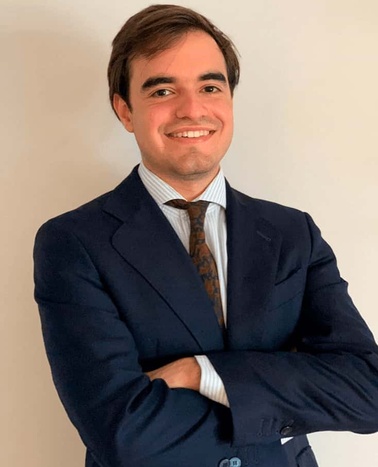
Miguel Romero
My name is Miguel Romero and I’m from Soria, Spain. After completing a dual bachelor’s degree in Business Administration and Law at Comillas Pontifical University’s ICADE Business School, I wanted to continue my education with IE Law School’s Doble Máster en Abogacía y Asesoría Jurídica de Empresas Bilingüe. While studying the Dual Degree, I participated in an exchange semester at Boston University School of Law in 2018. During this time, I also did an internship at GAEA Inversión as an investment analyst, as well as at international law firm Allen & Overy. I currently live in Madrid, where I enjoy everything the city has to offer and use my free time to go for a run or play sports such as padel.

"The bilingual master’s degree gives you a competitive advantage over other professionals, because studying in English prepares you to work internationally."
 Why did you decide to do IE Law School’s Doble Máster en Abogacía y Asesoría Jurídica de Empresas Bilingüe?
Why did you decide to do IE Law School’s Doble Máster en Abogacía y Asesoría Jurídica de Empresas Bilingüe?
When I was in Boston completing the LL.M., I had the opportunity to work with the case method and study U.S. common law. It was there that I realized how important legal English was going to be in my future. The fact that this dual master’s degree was bilingual was one of the decisive factors when choosing to study at IE University, though I also took into account the prestige of the university’s programs, faculty and methodologies. In Boston, university life was incredible and very diverse because there were lots of universities in the area, such as Harvard or MIT. So that’s why I also really appreciate the enormous diversity that IE University has to offer.
As far as legal English is concerned, I think it can open a lot of doors for you. It’s paramount for lawyers of the future because many activities take place in English, especially in corporate law. The bilingual master’s degree gives you a competitive advantage over other professionals, because after studying different subjects in English for a year, you’re more prepared to work internationally.
What teaching methodology does the program follow and what were the subjects you liked the most?
We mainly use the case method, which involves a large daily workload, but is the ideal way to reinforce and improve the knowledge and skills acquired in the degree. There’s very little theoretical work, with professors instead focusing on hands-on projects. This way, classes are much more dynamic and beneficial to students.
One of my favorite subjects so far has been Corporate Law I, with Pilar Galeote. Pilar taught us—through different cases based on a fictitious company—the different concepts of corporate law. With this methodology, the classes were very dynamic and entertaining, and it would generate debates between the students and the professor. Pilar also presented various interactive cases using the technologies provided by IE University’s online campus.
IE University prepares you to be a multidisciplinary lawyer, adapted to new technologies, but without neglecting the technical part. To that end, the program uses a practical methodology combined with good teachers and a very demanding workload that makes you better prepared for when the time comes to make the leap into the world of work.
What does your collaboration with the Jean Monnet Chair entail? Can you tell us a bit about the projects that are underway?
I received a scholarship when I was accepted into the Dual Degree, which included having to collaborate with the university. I was assigned a role as a research assistant for the Jean Monnet Chair, alongside Marco de Benito. The chair is part of the ELI-UNIDROIT Project on European Rules of Civil Procedure.
My job as a research assistant is to help with the different academic tasks that Marco de Benito requests. For example, one of these tasks was to coordinate a team of IE University undergraduate students to put together an article for the journal European Review of Private Law. For me, this opportunity is an added bonus to my education, allowing me to get to know professors like Marco de Benito and to collaborate with IE University in a different way.
Where are you going to intern when you finish the master’s degree? How did you land the internship?
When I’m done, I’m going to do an internship at Linklaters, an international firm with a strong presence in Spain. To secure it, I had to go through a demanding selection process, but I think both the dual bachelor’s degree and the dual master’s degree at IE University helped me a lot in obtaining this opportunity. It has not been an easy process, because Linklaters’ technical interviews tackle different areas of law in depth, and that can be extremely difficult. I was able to succeed in these interviews thanks to the level of knowledge I gained in the Doble Máster en Abogacía y Asesoría Jurídica de Empresas Bilingüe, and the fact that in the program we go over and reinforce the specific knowledge needed to do well in selection processes like these. During my internship period, I hope to learn a lot and develop on both a personal and professional level.